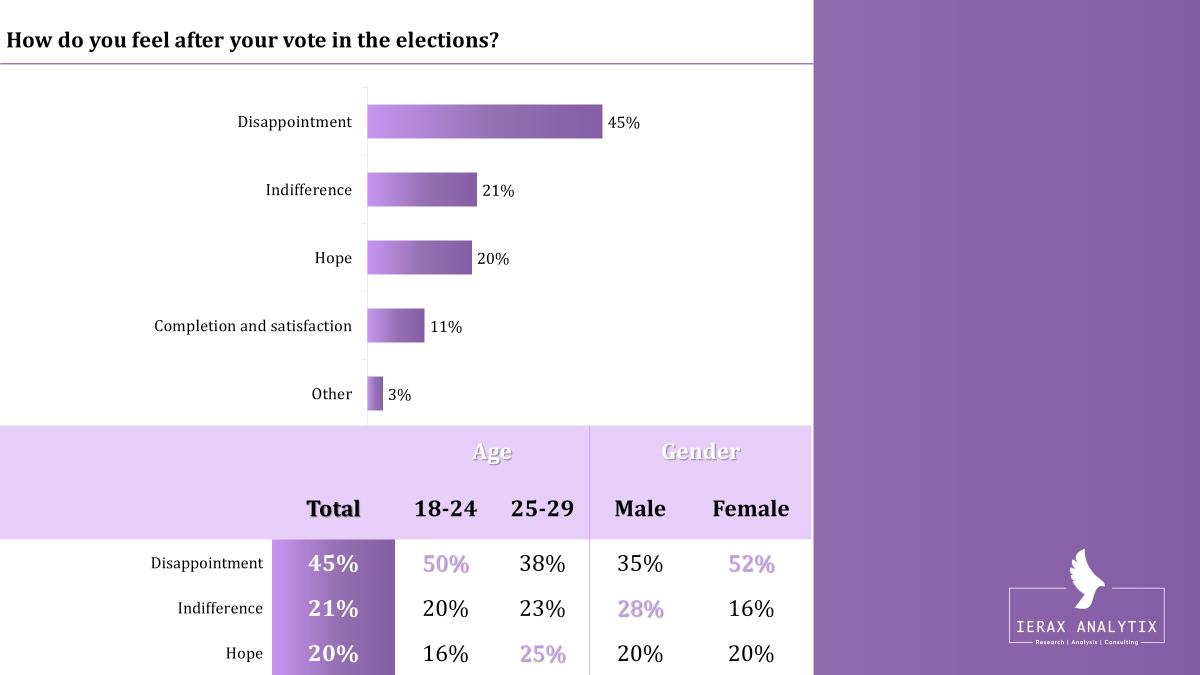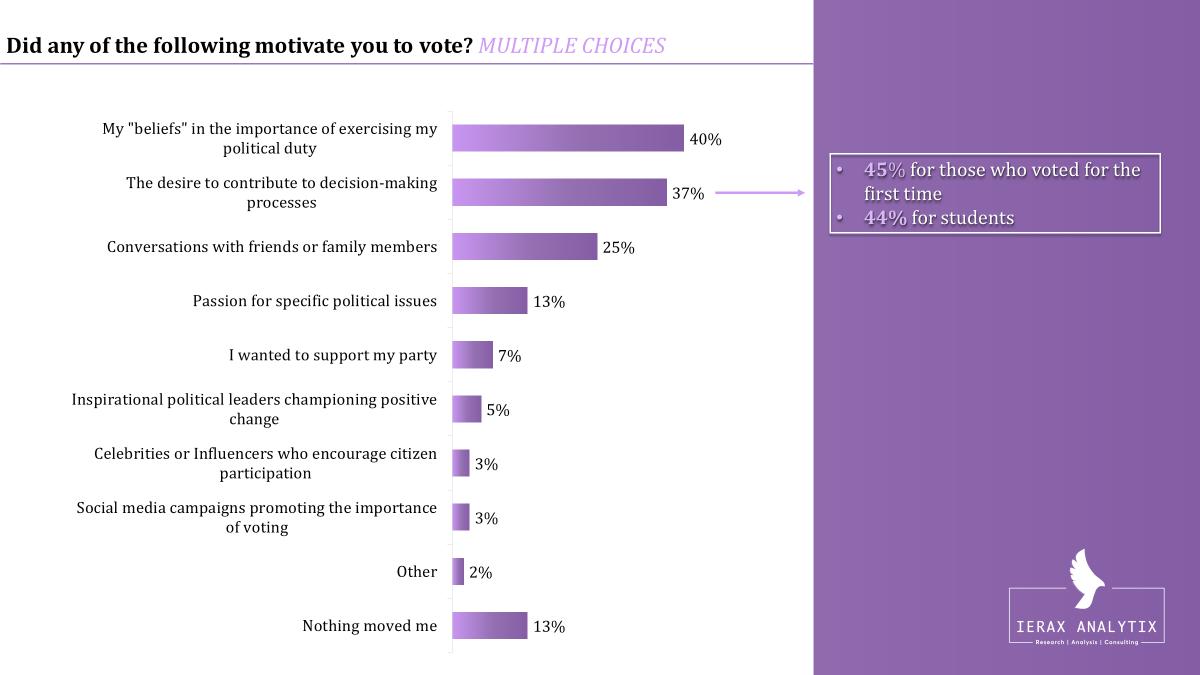Analyzing the youth vote in Greece’s 2023 parliamentary elections

Why do people vote? Only rarely do we ask the question. Campaign managers like to think they can predict how voters in a given constituency will behave. Political analysts believe they know why people refrain from voting. Do we ever really consider the process behind one’s deciding to participate, to partake of the right to vote?
What matters to younger voters, in particular? What drives citizens in their 20s, notorious for their higher-than-average abstention rates and recurring distrust, to cast their ballots come election day?
There is evidence in democracies throughout Europe and beyond to the effect that these younger citizens are now actually voting in greater numbers and with greater regularity and commitment and impact than ever before, just as they are engaging more fruitfully across the political spectrum, as poll workers, as campaign hands and, eventually, as candidates. Whither Hellas?
The question was bridged inconclusively by interested parties in Greece and abroad before the electoral campaign of May 2023. To examine whether these trends extend to the Greek electorate and provide new perspectives on youth participation in Greece, the Dukakis Center, an independent, not-for-profit civic engagement hub at the American College of Thessaloniki (ACT), commissioned an exclusive post-election poll by Athens-based pollster Ierax Analytix, who studied the youth vote in the May 21 and June 25 parliamentary elections, with half an eye on this month’s local elections and the European elections in June 2024.
A sample of 524 respondents aged 18-29 from throughout Greece was questioned online between September 4-14, while 20 additional extended face-to-face interviews were also conducted. The poll was unique in that it focused exclusively on youth who actually voted, and sought to understand how they approached this civic exercise (contrary to research undertaken by scholars like Athanasia Chalari, for example, who has examined cases involving Greek voters who deliberately abstain from voting).
What do the data reveal? Were the 2023 elections “an exercise in disillusionment,” as one commentator has concluded? Or can it be concluded, to paraphrase a Eurobarometer survey conducted after the 2019 European elections, that Greek elections are “entering a new direction”?
‘Mixed feelings’
After a first half of 2023 marked by human and natural catastrophe, Hellenes – in Greece and in select countries abroad – were called not once but twice to vote in parliamentary elections, on May 21 and then on June 25. New Democracy, led by the incumbent prime minister, Kyriakos Mitsotakis, prevailed on both occasions by nearly the same wide margin, in what one observer has dubbed the “clearest triumph” of any party since the end of the junta. Among the principal casualties in the summer’s electoral contests were SYRIZA, routed in both polls, and former prime minister Alexis Tsipras, who stepped down from the leadership of SYRIZA as a result of his party’s poor showing. Meanwhile, three marginal far-right formations seated MPs, in a further shock to the political system.
Overall turnout in May was up vis-a-vis 2019, but then plunged by nearly 9% in June. Relative bright spots were the large number of absentee ballots cast from select countries abroad and the turnout of voters in the 18-29 age cohort, particularly in May. Younger voters, perennially oriented ideologically to the left, supported center-right New Democracy in surprising numbers in both 2023 elections, leaving some observers to lament the Left Turn that wasn’t. (It is perhaps more accurate to note that SYRIZA’s share of the youth vote shrank dramatically in 2023 compared to 2019.) It remains to be seen whether this reflects a long-term realignment, whether, as the journalists Jason Horowitz and Niki Kitsantonis put it on the eve of the June 25 election, “youthful radicalism has given way to unexpected pragmatism, a yearning for prosperity and a steady hand.”
What stands out from poll data is a clear feeling of ambivalence among voters queried. On the one hand, one votes out of a sense of civic duty and, with a relative degree of enthusiasm, looks forward to voting again. By the same token, however, aside from rare exceptions, one expresses little satisfaction with the choices offered. Neither the political parties nor the individual candidates generate much excitement. More than one interviewee was exasperated that Kostas Karamanlis was the highest vote getter on the same New Democracy ticket with Prime Minister Mitsotakis. Mixed emotions prevail in the best of cases over the prospect for meaningful progress.

Also revealed in the data is the fact that young Greek voters, like their counterparts in North America and elsewhere in Europe, are turning with ever greater frequency and regularity to alternative sources of information. Traditional mass media – television, newspapers and especially radio – have been firmly replaced here by social media – above all Instagram and Facebook. If a candidate does not have a presence on the internet, it is said, they simply do not exist for the youth cohort. There does not appear to be much difference in this regard between first-time voters and those in their mid-20s who had already voted previously.
One discerns quite clearly from the data a veritable generation gap separating youth from their elders. The extent to which this gap is indicative of a potential sea change in politicking is not yet evident. Younger voters continued in 2023 to be oriented toward left-wing or center-left parties, but the degree to which Mitsotakis was able to generate a youth following via social media, TikTok in particular, had already drawn attention. How long will it last?
The data thus offer a picture which tends to mirror political sentiment in Britain and the United States, but which is largely at odds with a narrative emanating from Brussels. Despite variations and nuances within the broader youth cohort examined in the poll, there persists in Greek electoral politics an endemic, systemic, cross-generational malaise – call it what you will: cynicism, disappointment, disaffection – even among those who made a conscious decision to vote, to participate.
‘Desire to contribute’
So why vote, then? This is the crux of the matter and the ultimate rationale behind the Ierax Analytix poll.
Most respondents were generally well educated; a considerable number were graduates of universities. The issues closest to their hearts were education and health, followed by the economy and the state of the job market. A large plurality were preoccupied with the train accident outside Tempe in late February this year, and were aware of other external occurrences prior to the election. Looking to the future, there was some ambivalence about whether the younger generation would make their mark in Greek society in the future.

Most of those who responded to the poll voted in both elections, although the reasons given by those who voted in May only were more varied and imply some backsliding. Was this out of skepticism, resignation, election fatigue? Glass half-full, one wants to believe that young voters are sincere in their professions of civic responsibility. A good 70% of those polled intend to vote again, echoing sentiments revealed in other polls. Paradoxically, perhaps, Lina Zirganou-Kazolea and Maro Pantelidou-Maloutas have suggested that for the youth cohort “voting… is of less importance than the overall vision of society that the voters hope for… which is only slightly discernible in the electoral results.” This cannot be confirmed from the Ierax Analytix poll: We lack insight into whether these same voters participate by other means, including attending rallies or taking part in protests, supporting candidates for party leadership positions or running for public office themselves. Nor does this same poll include data on attitudes and behavior patterns among those who voted from abroad. There is nothing, finally, which might correspond to a recent Gallup survey which seems to show that youth in the United States no longer feel proud to be American.
Our glass half-full barely corroborates rosy findings in the 2019 Eurobarometer post-election report. But the horizon is not entirely overcast. Young voters may have acted out of a sense of obligation (voting is obligatory in Greece, after all); they may have succumbed to peer pressure, or have honored a family tradition; they may simply have developed the habit of voting on election day. However, some 70% of those polled claim to have wanted to make a difference, to contribute. This finding does mirror Eurobarometer polling, which has highlighted a growing “sense of civic duty” among voters throughout Europe.
Greeks voted yet again in local elections in early October. Impressionistic data suggests that non-negligible numbers of students and young professionals were recruited to fill the extended ranks of the different formations competing in municipal contests. How the same youth who voted during the summer of 2023, for reasons noble or less so, will have performed in the civic arena in October and again in June 2024 in European elections will go a long way toward validating a sense of wary optimism over the future of democratic institutions in Greece.
David Wisner is professor of international relations at ACT and executive director of the Michael and Kitty Dukakis Center for Public and Humanitarian Service. Haris Lalatsis is a market analyst and founder of Ierax Analytix. The opinions expressed in the article are their own.
The Dukakis Center will host a public discussion of the Ierax Analytix poll on Wednesday, October 18 at 6 p.m. at the Thessaloniki TechLab (136 Tsimiski).





